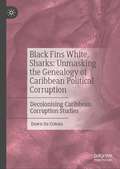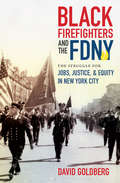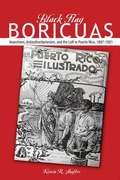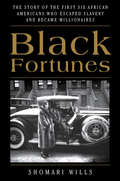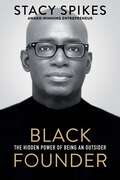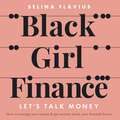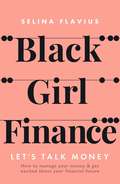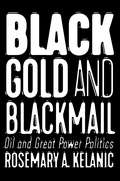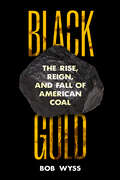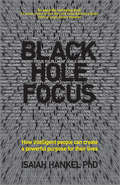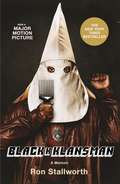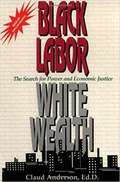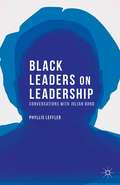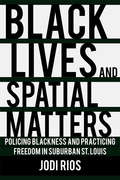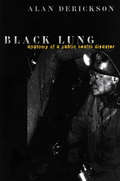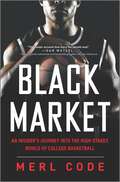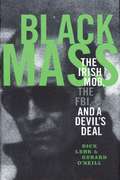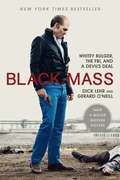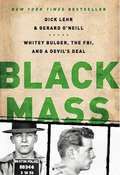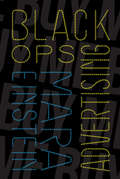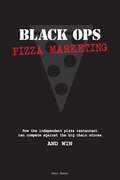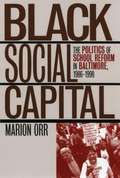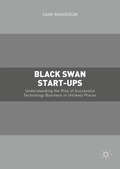- Table View
- List View
Black Fins White Sharks: Decolonising Caribbean Corruption Studies
by Dawn De CoteauThis book is a pioneering multi-disciplinary analytical study of Caribbean political corruption grounded in Caribbean epistemology, challenging universalist perceptions generated outside the region which take no account of historical and cultural elativity. In tracing the history and development of Caribbean political systems and corruption, it collates and synthesizes existing data, indispensable to current and future research. Rigorous analysis of international corruption measurement tools demonstrates deficiencies and limited validity for small island states in the Caribbean and worldwide. Highly detailed case studies and fieldwork research investigating perceptions of corruption and democratic capacity present invaluable new empirical data and offer insights into remodelling corruption analysis. With its wide cross-disciplinary appeal, this book makes significant and timely contributions to decolonial studies and an emerging decolonization discourse in the Caribbean.
Black Firefighters and the FDNY: The Struggle for Jobs, Justice, and Equity in New York City (Justice, Power, and Politics)
by David GoldbergFor many African Americans, getting a public sector job has historically been one of the few paths to the financial stability of the middle class, and in New York City, few such jobs were as sought-after as positions in the fire department (FDNY). For over a century, generations of Black New Yorkers have fought to gain access to and equal opportunity within the FDNY. Tracing this struggle for jobs and justice from 1898 to the present, David Goldberg details the ways each generation of firefighters confronted overt and institutionalized racism. An important chapter in the histories of both Black social movements and independent workplace organizing, this book demonstrates how Black firefighters in New York helped to create affirmative action from the "bottom up," while simultaneously revealing how white resistance to these efforts shaped white working-class conservatism and myths of American meritocracy.Full of colorful characters and rousing stories drawn from oral histories, discrimination suits, and the archives of the Vulcan Society (the fraternal society of Black firefighters in New York), this book sheds new light on the impact of Black firefighters in the fight for civil rights.
Black Flag Boricuas: Anarchism, Antiauthoritarianism, and the Left in Puerto Rico, 1897-1921
by Kirwin R. ShafferThis pathbreaking study examines the radical Left in Puerto Rico from the final years of Spanish colonial rule into the 1920s. Positioning Puerto Rico within the context of a regional anarchist network that stretched from Puerto Rico and Cuba to Tampa, Florida, and New York City, Kirwin R. Shaffer illustrates how anarchists linked their struggle to the broader international anarchist struggles against religion, governments, and industrial capitalism. Their groups, speeches, and press accounts--as well as the newspapers that they published--were central in helping to develop an anarchist vision for Puerto Ricans at a time when the island was a political no-man's-land, neither an official U.S. colony or state nor an independent country. Exploring the rise of artisan and worker-based centers to develop class consciousness, Shaffer follows the island's anarchists as they cautiously joined the AFL-linked Federación Libre de Trabajadores, the largest labor organization in Puerto Rico. Critiquing the union from within, anarchists worked with reformers while continuing to pursue a more radical agenda achieved by direct action rather than parliamentary politics. Shaffer also traces anarchists' alliances with freethinkers seeking to reform education, progressive factions engaged in attacking the Church and organized religion, and the emerging Socialist movement on the island in the 1910s. The most successful anarchist organization to emerge in Puerto Rico, the Bayamón bloc founded El Comunista, the longest-running, most financially successful anarchist newspaper in the island's history. Stridently attacking U.S. militarism and interventionism in the Caribbean Basin, the newspaper found growing distribution throughout and financial backing from Spanish-speaking anarchist groups in the United States. Shaffer demonstrates how the U.S. government targeted the Bayamón anarchists during the Red Scare and forced the closure of their newspaper in 1921, effectively unraveling the anarchist movement on the island.
Black Food Geographies: Race, Self-reliance, And Food Access In The Nation's Capital
by Ashanté ReeseIn this book, Ashante M. Reese makes clear the structural forces that determine food access in urban areas, highlighting Black residents' navigation of and resistance to unequal food distribution systems. Linking these local food issues to the national problem of systemic racism, Reese examines the history of the majority-Black Deanwood neighborhood of Washington, D.C. Based on extensive ethnographic fieldwork, Reese not only documents racism and residential segregation in the nation's capital but also tracks the ways transnational food corporations have shaped food availability. By connecting community members' stories to the larger issues of racism and gentrification, Reese shows there are hundreds of Deanwoods across the country. Reese's geographies of self-reliance offer an alternative to models that depict Black residents as lacking agency, demonstrating how an ethnographically grounded study can locate and amplify nuances in how Black life unfolds within the context of unequal food access.
Black Fortunes: The Story of the First Six African Americans Who Escaped Slavery and Became Millionaires
by Shomari Wills<p>The astonishing untold history of America’s first black millionaires—former slaves who endured incredible challenges to amass and maintain their wealth for a century, from the Jacksonian period to the Roaring Twenties—self-made entrepreneurs whose unknown success mirrored that of American business heroes such as Henry Ford, John D. Rockefeller, and Thomas Edison. <p>While Oprah Winfrey, Jay-Z, Beyoncé, Michael Jordan, and Will Smith are among the estimated 35,000 black millionaires in the nation today, these famous celebrities were not the first blacks to reach the storied one percent. Between the years of 1830 and 1927, as the last generation of blacks born into slavery was reaching maturity, a small group of smart, tenacious, and daring men and women broke new ground to attain the highest levels of financial success. <p>Black Fortunes is an intriguing look at these remarkable individuals, including Napoleon Bonaparte Drew—author Shomari Wills’ great-great-great-grandfather—the first black man in Powhatan County (contemporary Richmond) to own property in post-Civil War Virginia. His achievements were matched by five other unknown black entrepreneurs including: <p> <li>Mary Ellen Pleasant, who used her Gold Rush wealth to further the cause of abolitionist John Brown; <li>Robert Reed Church, who became the largest landowner in Tennessee; <li>Hannah Elias, the mistress of a New York City millionaire, who used the land her lover gave her to build an empire in Harlem; <li>Orphan and self-taught chemist Annie Turnbo-Malone, who developed the first national brand of hair care products; <li>Madam C. J Walker, Turnbo-Malone’s employee who would earn the nickname America’s "first female black millionaire;" <li>Mississippi school teacher O. W. Gurley, who developed a piece of Tulsa, Oklahoma, into a "town" for wealthy black professionals and craftsmen" that would become known as "the Black Wall Street."</li> <p> <p>A fresh, little-known chapter in the nation’s story—A blend of Hidden Figures, Titan, and The Tycoons—Black Fortunes illuminates the birth of the black business titan and the emergence of the black marketplace in America as never before.</p>
Black Founder: The Hidden Power of Being an Outsider
by Stacy SpikesAn empowering, inspiring, instructive, and essential blueprint for success from the award-winning entrepreneur who USA Today named one of the 21 most influential Blacks in technology and is the co-founder and former CEO of the nation&’s first mobile theatrical subscription company, MoviePass, and founder of the Urbanworld Film Festival. Bracingly honest, as well as entertaining, this inspiring business memoir includes outrageous anecdotes featuring the likes of Harvey Weinstein and Eddie Murphy.From the award-winning entrepreneur USA Today named one of the 21 most influential Blacks in technology comes an empowering, bracingly honest, entertaining blueprint for success in life and work—including the true story of what really happened to MoviePass, the nation&’s groundbreaking first-ever theatrical subscription service—straight from the co-founder and former CEO himself… Stacy Spikes knows what&’s it like to be an outsider. He certainly knew he didn&’t fit the mold of a successful future tech entrepreneur. But he marshaled his resilience and ultimately set out to shatter that mold—along with the glass ceiling that came with it. Finding his footing in the tech world was an education in the complexities of being an outsider—but as Stacy came to see, rather than a hindrance, it afforded him a unique position of power. Beginning as a film studio gopher, Spikes quickly rose through the industry ranks, being named one of the Hollywood Reporter&’s 30 Under 30. Still, he was an outsider looking in. So he set out to make his own dreams a reality. Defying expectations, Spikes effectively disrupted the status quo and reinvented himself from junior executive to CEO Tech Founder. What ensued was an escalating adventure with bigger stages, bigger risks, and a roller-coaster ride of exhilarating ascent—unpredictable collapse—and a story book return. Now Spikes shares his challenges, pitfalls, and keys to personal and professional fulfillment. He shows how the seemingly impossible can be overcome by having faith in oneself and creating from a place of confidence. Taking readers inside the battles of the boardroom and beyond, Black Founder is a business memoir that will inspire every outsider who has a dream.
Black Girl Finance
by Selina FlaviusSTART FINANCIALLY THRIVING WITH BLACK GIRL FINANCE Personal finance is a neglected area of personal development and it shouldn't be. We handle money every single day and, for women negatively impacted by the intersection of the gender and ethnicity pay gaps, we can't afford to NOT talk about money. Selina Flavius set up Black Girl Finance to provide a safe space for a community of unapologetic, money-minded women to get real about their financial goals. It's the platform she wishes she had access to when she was growing up and heading out into the workplace, so she could have felt empowered in her financial decisions andavoided countless bad money habits.Selina uses these hard-won insights to help you improve your money management skills - from challenging your money mindset to learning key financial skills, such as how to set up an emergency fund and where to start with budgeting, investing and saving. Black Girl Finance is the guide every woman needs to start their financial journey. Packed with tips, tricks and tools, as well as statistics, personal stories, goal-setting exercises and straight-talking advice, this will be your go-to helping hand when it comes to making your financial goals a reality. So, let's get excited about our financial futures and start having money conversations today.(P)2021 Quercus Editions Limited
Black Girl Finance: Let's Talk Money
by Selina Flavius'This accessible and non-preachy guide [...] is the finance guide you'll keep passing around your friends' COSMOPOLITAN'Reading Black Girl Finance has given me a thorough reminder of what I need to do to get my finances in tip top shape for 2021. It's a guide I keep close to me' - BOLA SOL'A quick, easy read with practical advice and tips' - ELIZABETH OGABI, founder of For Working LadiesSTART FINANCIALLY THRIVING WITH BLACK GIRL FINANCEWe don't like getting real about money, do we? We think maths, we think spreadsheets, we think boring. But Selina Flavius, founder of Black Girl Finance, wants to show that there can be another, better way. A way to start making our hard-earned money work even harder for us.Selina Flavius created Black Girl Finance to address the unique difficulties Black women face due to the gender and ethnicity pay gaps. Since we literally can't afford to wait for change, we need to start changing things up for ourselves. From challenging money mindsets to teaching key skills, such as how to set up an emergency fund and where to start with budgeting, investing and saving, Black Girl Finance provides a safe space for a community of unapologetic, ambitious, money-minded women to get real about their finances.Kick-start your financial journey with Black Girl Finance - the first financial guide of its kind. Packed with tips, tricks and tools, as well as statistics, personal stories, goal-setting exercises and straight-talking advice, this will be your go-to helping hand when it comes to making your financial goals a reality.
Black Gold and Blackmail: Oil and Great Power Politics
by Rosemary A. KelanicBlack Gold and Blackmail seeks to explain why great powers adopt such different strategies to protect their oil access from politically motivated disruptions. In extreme cases, such as Imperial Japan in 1941, great powers fought wars to grab oil territory in anticipation of a potential embargo by the Allies; in other instances, such as Germany in the early Nazi period, states chose relatively subdued measures like oil alliances or domestic policies to conserve oil. What accounts for this variation? Fundamentally, it is puzzling that great powers fear oil coercion at all because the global market makes oil sanctions very difficult to enforce.Rosemary A. Kelanic argues that two variables determine what strategy a great power will adopt: the petroleum deficit, which measures how much oil the state produces domestically compared to what it needs for its strategic objectives; and disruptibility, which estimates the susceptibility of a state's oil imports to military interdiction—that is, blockade. Because global markets undercut the effectiveness of oil sanctions, blockade is in practice the only true threat to great power oil access. That, combined with the devastating consequences of oil deprivation to a state's military power, explains why states fear oil coercion deeply despite the adaptive functions of the market.Together, these two variables predict a state's coercive vulnerability, which determines how willing the state will be to accept the costs and risks attendant on various potential strategies. Only those great powers with large deficits and highly disruptible imports will adopt the most extreme strategy: direct control of oil through territorial conquest.
Black Gold: The Rise, Reign, and Fall of American Coal
by Bob WyssCoal's central role in America's history and its ongoing threats in the climate crisis. For decades coal has been crucial to America's culture, society, and environment, an essential ingredient in driving out winter's cold, cooking meals, and lighting the dark. In the coalfields and beyond, Bob Wyss describes how this magical elixir sparked the Industrial Revolution, powered railroads, and built urban skylines, while providing home comforts for families. Coal's history and heritage are fundamental to understanding its legacy of threats to America's well-being. As industry developed so did clashes between powerful tycoons, coal miners, and innocent families. Exploitation and avarice led to victimization, deadly violence, and ultimately the American labor movement. More recently coal has endangered American lives and safety, brought on by two centuries of carbon combustion, and here the threat remains unresolved. This is coal's most enduring legacy, and Black Gold is pivotal in helping us understand how we got to this point.
Black Hole Focus
by Isaiah Hankel". . . an absurdly motivating book. " -A. J. Jacobs, New York Times bestselling author Don't get stuck on a career path you have no passion for. Don't waste your intelligence on something that doesn't really mean anything more to you than a paycheck. Let Isaiah Hankel help you define a focus so powerful that everything in your life will be pulled towards it. Create your purpose and change your life. Be focused. Be fulfilled. Be successful. Black Hole Focus has been endorsed by top names in business, entrepreneurship, and academia, including 4 times New York Times bestseller AJ Jacobs and Harvard Medical School Postdoc Director Dr. Jim Gould. The book is broken up into 3 different sections; the first section shows you why you need a purpose in life, the second section shows you how to find your new purpose, and the third section shows you how to achieve your goals when facing adversity. In this book, you will learn: How to understand what you really want in life and how to get it Why people with a powerful purpose live to 100 How to rapidly improve focus and change your life using the secret techniques of an international memory champion How people like Jim Carrey, Oprah Winfrey, and J. K. Rowling transformed pain into purpose How to start a business by avoiding willpower depletion and the life hack lie Black Hole Focus includes exclusive case studies from medical practitioners, research scientists, lawyers, corporate executives and small business owners who have used the techniques described in this book to achieve massive success in their own lives About the Author: Dr. Hankel is an internationally recognized expert in the biotechnology industry and prolific public speaker. He's given over 250 seminars in 22 different countries while working with many of the world's most respected companies and institutions, including Harvard University, Oxford University, Roche Pharmaceuticals, Eli Lilly & Company, Baxter International and Pfizer. Dr. Hankel uses the science of purpose and the principles of entrepreneurship to help people achieve their biggest goals.
Black Klansman: Race, Hate, and the Undercover Investigation of a Lifetime
by Ron StallworthThe extraordinary true story and basis for the major motion picture BlacKkKlansman, written and directed by Spike Lee, produced by Jordan Peele, and starring John David Washington and Adam Driver. <P><P>When detective Ron Stallworth, the first black detective in the history of the Colorado Springs Police Department, comes across a classified ad in the local paper asking for all those interested in joining the Ku Klux Klan to contact a P.O. box, Detective Stallworth does his job and responds with interest, using his real name while posing as a white man. <P><P>He figures he’ll receive a few brochures in the mail, maybe even a magazine, and learn more about a growing terrorist threat in his community. A few weeks later the office phone rings, and the caller asks Ron a question he thought he’d never have to answer, “Would you like to join our cause?” <P><P>This is 1978, and the KKK is on the rise in the United States. Its Grand Wizard, David Duke, has made a name for himself, appearing on talk shows, and major magazine interviews preaching a “kinder” Klan that wants nothing more than to preserve a heritage, and to restore a nation to its former glory. <P><P>Ron answers the caller’s question that night with a yes, launching what is surely one of the most audacious, and incredible undercover investigations in history. Ron recruits his partner Chuck to play the "white" Ron Stallworth, while Stallworth himself conducts all subsequent phone conversations. <P><P>During the months-long investigation, Stallworth sabotages cross burnings, exposes white supremacists in the military, and even befriends David Duke himself. Black Klansman is an amazing true story that reads like a crime thriller, and a searing portrait of a divided America and the extraordinary heroes who dare to fight back. <P><b>A New York Times Bestseller</b>
Black Labor, White Wealth: The Search for Power and Economic Justice
by Claud AndersonDr. Anderson's first book is a classic. It tracks slavery and Jim Crow public policies that used black labor to construct a superpower nation. It details how black people were socially engineered into the lowest level of a real life Monopoly game, which they are neither playing or winning. Black Labor is a comprehensive analysis of the issues of race. Dr. Anderson uses the analysis in this book to offer solutions to America's race problem.
Black Leaders On Leadership
by Phyllis LefflerDrawing on a wealth of oral interviews, Conversations on Black Leadership uses the lives of prominent African Americans to trace the contours of Black leadership in America. Included here are fascinating accounts from a wide variety of figures such as John Lewis, Clarence Thomas, Eleanor Holmes Norton, Angela Davis, Amiri Baraka, and many more.
Black Lives and Spatial Matters: Policing Blackness and Practicing Freedom in Suburban St. Louis (Police/Worlds: Studies in Security, Crime, and Governance)
by Jodi RiosBlack Lives and Spatial Matters is a call to reconsider the epistemic violence that is committed when scholars, policymakers, and the general public continue to frame Black precarity as just another racial, cultural, or ethnic conflict that can be solved solely through legal, political, or economic means. Jodi Rios argues that the historical and material production of blackness-as-risk is foundational to the historical and material construction of our society and certainly foundational to the construction and experience of metropolitan space. She also considers how an ethics of lived blackness—living fully and visibly in the face of forces intended to dehumanize and erase—can create a powerful counter point to blackness-as-risk.Using a transdisciplinary methodology, Black Lives and Spatial Matters studies cultural, institutional, and spatial politics of race in North St. Louis County, Missouri, as a set of practices that are intimately connected to each other and to global histories of race and race-making. As such, the book adds important insight into the racialization of metropolitan space and people in the United States. The arguments presented in this book draw from fifteen years of engaged research in North St. Louis County and rely on multiple disciplinary perspectives and local knowledge in order to study relationships between interconnected practices and phenomena.
Black Lung: Anatomy of a Public Health Disaster
by Alan DericksonIn the definitive history of a twentieth-century public health disaster, Alan Derickson recounts how, for decades after methods of prevention were known, hundreds of thousands of American miners suffered and died from black lung, a respiratory illness caused by the inhalation of coal mine dust. The combined failure of government, medicine, and industry to halt the spread of this disease--and even to acknowledge its existence--resulted in a national tragedy, the effects of which are still being felt. The book begins in the late nineteenth century, when the disorders brought on by exposure to coal mine dust were first identified as components of a debilitating and distinctive illness. For several decades thereafter, coal miners' dust disease was accepted, in both lay and professional circles, as a major industrial disease. Derickson describes how after the turn of the century medical professionals and industry representatives worked to discredit and supplant knowledge about black lung, with such success that this disease ceased to be recognized. Many authorities maintained that breathing coal mine dust was actually beneficial to health. Derickson shows that activists ultimately forced society to overcome its complacency about this deadly and preventable disease. He chronicles the growth of an unprecedented movement--from the turn-of-the-century miners' union, to the social medicine activists in the mid-twentieth century, and the black lung insurgents of the late sixties--which eventually won landmark protections and compensation with the enactment of the Federal Coal Mine Health and Safety Act in 1969. An extraordinary work of scholarship, Black Lung exposes the enormous human cost of producing the energy source responsible for making the United States the world's preeminent industrial nation.
Black Market: An Insider's Journey into the High-Stakes World of College Basketball
by Merl CodeFrom a former college basketball player and shoe rep for Nike, this explosive insider's account into the dark underworld of college basketball exposes the corrupt and racist systems that exploit young athletes and offers a new way forwardFor Merl Code, basketball was life. In college he played point guard for Clemson before turning pro. Later, with a keen eye for talent and vested interest in the basketball community, he pivoted to marketing, where he was eager to build relationships with young athletes who might one day become ambassadors for Nike and Adidas. But as his network expanded and his responsibilities as a shoe rep grew, he found himself thrust into the dark underbelly of profit-driven college basketball programs, and the storied coaches who led them. He realized that the NCAA's amateurism rules, which prohibit athletes from receiving compensation until they go pro, were exploiting young athletes, and athletes of color in particular. Colleges and universities, he observed, were using corporate sponsors to circumvent the NCAA's bylaws, and employees like Code were stuck in the middle. Now, for the first time, Code will share his side of the explosive story of college basketball's dark reality. Code has engaged with the sport at every level—from the AAU circuit, to college recruiting battles, to wooing NBA stars to sign sneaker deals. He&’s been responsible for recruiting athletes like Zion Williamson, Anthony Davis, and Giannis Antetokounmpo to endorse the shoes of his employers. But Code has also seen the darker side of college basketball. He recounts how he became the fall guy for a bribery scandal involving payments to college and high school athletes, while the storied coaches implicated by the FBI were not charged and still walk the sidelines. Highlighting stories of real athletes and their families and what&’s at stake for them, Code pulls back the curtain on the systemic problem of using players for financial gain in college athletics. Propulsive, urgent, and eye-opening, Black Market exposes the truth to offer a more just way forward for both colleges and athletes.
Black Mass
by Dick Lehr Gerard O'NeillTwo boys - John Connolly and James "Whitley" Bulger - grew up together on the streets of South Boston. Decades later, in the mid-1970s, they would meet again. By then, Connolly was a major figure in the FBI's Boston office and Whitley had become godfather of the Irish mob. Connolly had an idea, a scheme that might bring Bulger into the FBI fold and John Connolly into the Bureau's big leagues. But Bulger had other plans. "Black Mass" is the story of what happened beween them - a dark deal to trade secrets and take down Boston's Italian Mafia in exchange for "immunity" - that spiralled out of control, leading to murders, drug dealing and racketeering indictments. Ultimately, in what would become the biggest internal scandal in the history of the FBI, Bulger would find himself at the top of the FBI's Ten Most Wanted List. Told in gripping narrative style by the "Boston Globe" reporters who covered the case from the beginning, "Black Mass" is a riveting epic crime story that is also a book about Irish America, about the pull of place, and about the ties that bind.
Black Mass
by Dick Lehr Gerard O'NeillJohn Connolly and James "Whitey" Bulger grew up together on the tough streets of South Boston. Decades later in the mid-1970s, they met again. By then, Connolly was a major figure in the FBI's Boston office and Whitey had become godfather of the Irish Mob. Connolly had an idea, a scheme that might bring Bugler into the FBI fold and John Connolly into the Bureau's big leagues. But Bulger had other plans. Soon to be a major motion picture starring Johnny Depp as Whitey Bulger, Black Mass is the chilling true story of what happened between them--a dark deal that spiraled out of control, leading to drug dealing, racketeering, and murder.
Black Mass
by Dick Lehr Gerard O'NeillJohn Connolly and James "Whitey" Bulger grew up together on the tough streets of South Boston. Decades later in the mid-1970s, they met again. By then, Connolly was a major figure in the FBI's Boston office and Whitey had become godfather of the Irish Mob. Connolly had an idea, a scheme that might bring Bugler into the FBI fold and John Connolly into the Bureau's big leagues. But Bulger had other plans. Soon to be a major motion picture starring Johnny Depp as Whitey Bulger, Black Mass is the chilling true story of what happened between them--a dark deal that spiraled out of control, leading to drug dealing, racketeering, and murder.
Black Mass: Whitey Bulger, the FBI, and a Devil's Deal
by Dick Lehr Gerard O'NeillJohn Connolly and James "Whitey" Bulger grew up together on the tough streets of South Boston. Decades later in the mid-1970s, they met again. By then, Connolly was a major figure in the FBI's Boston office and Whitey had become godfather of the Irish Mob. Connolly had an idea, a scheme that might bring Bugler into the FBI fold and John Connolly into the Bureau's big leagues. But Bulger had other plans. Soon to be a major motion picture starring Johnny Depp as Whitey Bulger, Black Mass is the chilling true story of what happened between them--a dark deal that spiraled out of control, leading to drug dealing, racketeering, and murder.
Black Ops Advertising: Native Ads, Content Marketing and the Covert World of the Digital Sell
by Mara EinsteinFrom Facebook to Talking Points Memo to the New York Times, often what looks like fact-based journalism is not. It's advertising. Not only are ads indistinguishable from reporting, the Internet we rely on for news, opinions and even impartial sales content is now the ultimate corporate tool. Reader beware: content without a corporate sponsor lurking behind it is rare indeed.Black Ops Advertising dissects this rapid rise of "sponsored content," a strategy whereby advertisers have become publishers and publishers create advertising-all under the guise of unbiased information. Covert selling, mostly in the form of native advertising and content marketing, has so blurred the lines between editorial content and marketing message that it is next to impossible to tell real news from paid endorsements. In the 21st century, instead of telling us to buy, buy, BUY, marketers "engage" with us so that we share, share, SHARE-the ultimate subtle sell.Why should this concern us? Because personal data, personal relationships, and our very identities are being repackaged in pursuit of corporate profits. Because tracking and manipulation of data make "likes" and tweets and followers the currency of importance, rather than scientific achievement or artistic talent or information the electorate needs to fully function in a democracy. And because we are being manipulated to spend time with technology, to interact with "friends," to always be on, even when it is to our physical and mental detriment.
Black Ops Pizza Marketing: How the Independent Pizzeria Owner Can Compete With the Big Chain Stores and Win
by Paul BakerBeat The Pants Off Your Competition! Here it is: the secretive underground strategies that 99% of pizzeria owners don't know about that will give you the "launch code" to creating explosive growth in your pizzeria and crippling your competitors. Pizza marketing expert Paul Baker reveals... - How you can add over $24,000 in net profit every year to your business literally overnight and costs you nothing to implement. - How to get your customers to aggressively do your selling for you. (This strategy cost him 88 cents and brought in $1287 in sales in only 3 days). - How you can increase the response of your yellow pages advertising by up to 400% and cut your ad cost to a fraction of what you're paying now. This tactic is so dirty it will make your competitions ad practically invisible! - How he added an additional $28,896 in pure profit when one of his competitors was on the ropes. (This strategy starts bringing in cash in less than 48 hours) - What to do on only a $500 advertising budget.
Black Social Capital: The Politics of School Reform in Baltimore, 1986-1998
by Marion OrrDeindustrialization, white flight, and inner city poverty have spelled trouble for Baltimore schools. Marion Orr now examines why school reform has been difficult to achieve there, revealing the struggles of civic leaders and the limitations placed on Baltimore's African-American community as each has tried to rescue a failing school system. Examining the interplay between government and society, Orr presents the first systematic analysis of social capital both within the African-American community ("black social capital") and outside it where social capital crosses racial lines. Orr shows that while black social capital may have created solidarity against white domination in Baltimore, it hampered African-American leaders' capacity to enlist the cooperation from white corporate elites and suburban residents needed for school reform. Orr examines social capital at the neighborhood level, in elite-level interactions, and in intergovernmental relations to argue that black social capital doesn't necessarily translate into the kind of intergroup coalition needed to bring about school reform. He also includes an extensive historical survey of the black community, showing how distrust engendered by past black experiences has hampered the formation of significant intergroup social capital. The book features case studies of school reform activity, including the first analysis of the politics surrounding Baltimore's decision to hire a private, for-profit firm to operate nine of its public schools. These cases illuminate the paradoxical aspects of black social capital in citywide school reform while offering critical perspectives on current debates about privatization, site-based management, and other reform alternatives. Orr's book challenges those who argue that social capital alone can solve fundamentally political problems by purely social means and questions the efficacy of either privatization or black community power to reform urban schools. Black Social Capital offers a cogent conceptual synthesis of social capital theory and urban regime theory that demonstrates the importance of government, politics, and leadership in converting social capital into a resource that can be mobilized for effective social change.
Black Swan Start-ups: Understanding the Rise of Successful Technology Business in Unlikely Places
by Sami MahroumThis book explores startups that have thrived against the odds in places where startup success was deemed to be unlikely. Discussing a number of technology startups from around the world that have succeeded without state backing nor local venture and seed capital, Black Swan Start Ups provides unique insights into unsung models of success beyond the two dominant narratives of Asia's 'Tiger Economies' and America's Silicon Valley miracle. The author describes these stories of success as 'black swan events' and ascribes their achievements to the ability of entrepreneurs to leverage the 'place surplus' of their locations, while building connections to support networks outside their immediate geographies. Including case studies such as Skype in Estonia, SoundCloud in Germany and Bayt. Com in Dubai, this insightful book gives a holistic and wide-ranging view of how technology startups have, and can, succeed in less likely places.
